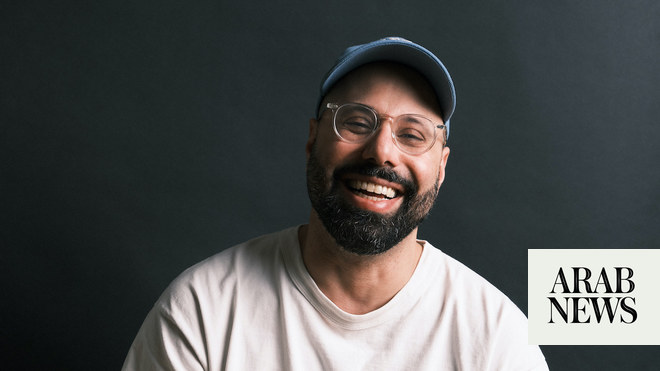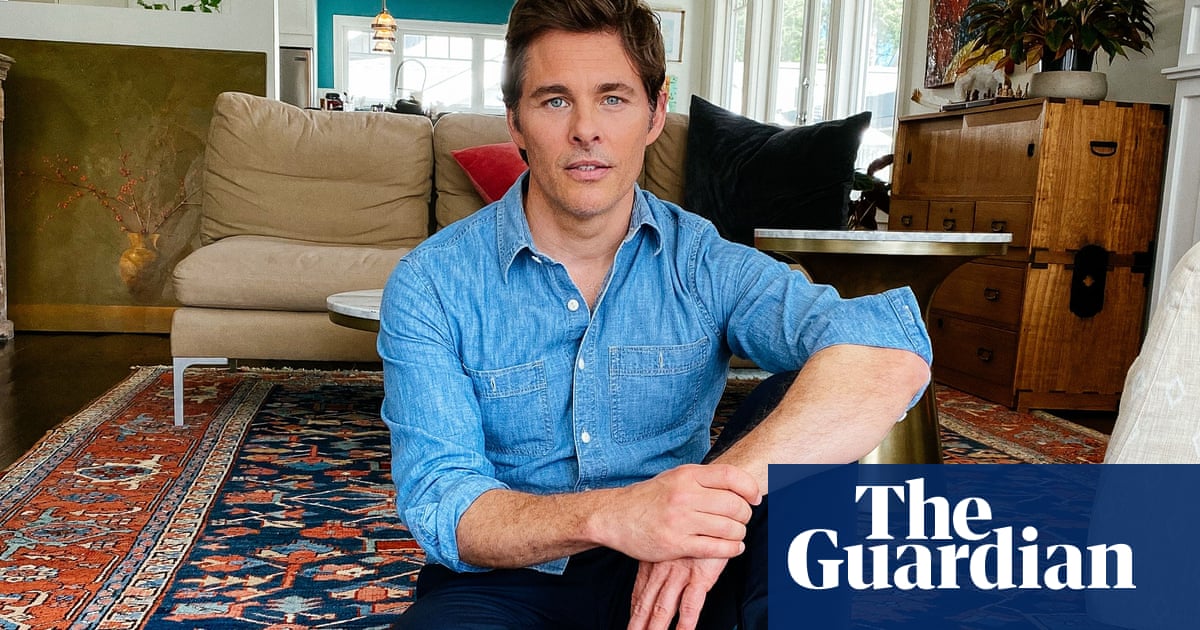
When Iain Stirling was working as a CBBC presenter in his 20s, he broke up with his long-term girlfriend. Unfortunately, the split occurred just hours before he was contractually obliged to go on a two-day trip to Bristol with the chronically cheerful pop duo Jedward. Later, mordantly recollecting the story in his standup – his original career before children’s TV got in the way – someone from his management team told him: “Your life would be a funny sitcom.”
Almost a decade later, the prediction came true: Stirling has indeed turned his life into a funny sitcom. Buffering begins on ITV2 this week, airing after Love Island, the show where he serves as a droll-yet-enthusiastic narrator. The sitcom follows a character called Iain who must navigate the routine humiliations of working in children’s entertainment, all the while trying to break into what he awkwardly refers to as “adult TV”. But Buffering isn’t merely semi-autobiographical navel-gazing: it also revolves around the lives of Iain’s flatmates – including Jessie Cave’s privileged artist Rosie and standup Janine Harouni’s straight-talking Thalia (there are also scene-stealing guest turns from Lolly Adefope, Alistair Green and Joel Dommett) – meaning the show doubles as a meditation on the myriad challenges of millennial life.
Stirling sees Buffering as a hybrid of sitcom styles. It’s a zippy, gag-dense (“because it’s for ITV”) studio comedy that features the sort of narrative threads you might expect to see in a gritty sadcom: the second episode ends with Iain and his on-off girlfriend (who also produces the kids’ show he presents) experiencing a miscarriage. Stirling and co-creator Steve Bugeja wanted to ape the feel of the fast-paced US shows they loved such as Modern Family and Brooklyn Nine-Nine, but were also determined to include more dramatic storylines that were “genuine, heartfelt and sincere. We know the perception of a sitcom coming on ITV2 straight after Love Island, so we thought: let’s try and Trojan-horse some stuff in there,” he says. They decided miscarriage would be an apt topic: “Me and few of the writers have gone through things like that, so we have first-hand experience.”
Partly due to the agonisingly protracted process of getting a new sitcom from the page to the screen, 33-year-old Stirling is no longer the creatively frustrated man-child Buffering revolves around; earlier this year he had a baby with the Love Island host Laura Whitmore. His wife’s celebrity and the pair’s association with the headline-grabbing reality show has bestowed upon Stirling a peculiar sort of fame: his personal life is now fodder for insatiable red-top clickbait. Yet he says making a show that draws on his real life actually feels like self-preservation.
“With a sitcom, the general underlying feelings and personality traits are all there so people can get an idea of me, but it can’t be taken out of context, which I like,” he says – unlike standup, podcasts and interviews. He singles out a joke he once made about his overdraft and shopping habits during an interview with Love Island winners Jack and Dani, which was reported as “Iain Stirling is in debt because he buys too many shoes.” [No Pound Stirling, was the Sun’s headline.] “You’ve then got your mum going: ‘Do you need any money?’ Oh God,” he says, shuddering at the memory.
Love Island, and the tragic events that sometimes surround it, has helped make this sort of press conduct a national talking point. Stirling believes that inserting the show into discussions about online trolling and mental health is often “actually just another distraction, we should be looking to where the actual problem is”.
But he also thinks the show has had a constructive effect. “What Love Island’s been great at is making people more aware that people [on social media] are human. You could be Kim Kardashian, you’re still a human being, you need to treat other human beings with respect and kindness, and not be awful to people.”
Stirling repeatedly references his own social media use, which he feels ambivalent about. He is currently Zooming from his very professional-looking “Twitch streaming room,” in which he plays Fifa for his 60,000 followers. His love for the gaming platform seems relatively straightforward. “The comedian Alfie Brown called it ‘longform social media’. You’ll stream for two to eight hours in a stint so it’s the truest representation of yourself because it’s unfiltered; you can only put on an act for so long.”
Traditional social media, however, does not carry the same positive associations. “I put my name into Twitter when I am on my own, bored and feeling a bit paranoid or lonely. If somebody says something nasty about me and saw that I’d seen it, they’d probably think: ‘Yeah that’s arrogant Stirling looking up his own name.’ Actually, I was probably just a little bit sad, and punishing myself for whatever reason.”
Stirling began his comedy career long before being in the public eye was quite so complicated. He grew up on an Edinburgh estate, and went to a “working-class, underachieving school, no exposure to the arts”, but soon became obsessed with his hometown’s live comedy circuit. He and his friend Greg would make a monthly pilgrimage to the Stand Comedy Club to see Susan Calman. Trips to the festival fringe “blew my mind”, he says. In their mid-teens, the pair staged their own sketch show at the festival, titled Just So Ever Slightly (they got a good, teenage boy-heavy turnout after his sister and her friends flyered on the Royal Mile).
Stirling studied law at Edinburgh (“The only boy from my year to go to university”) and, cut off from the comedy community during an exchange year in Norway, began to write standup. He performed it on his return to the UK, and in 2009, age 21, he was runner-up for the Chortle student comedy award (Joe Lycett won). That year, he began doing links for CBBC with a puppet called Hacker T Dog.
Nowadays, children’s TV is a destination for big-name comics, with CBBC sitcoms such as Zapped attracting the likes of Steve Coogan. This sea-change hasn’t gone unnoticed by Stirling.
“It’s so bloody annoying! I spent years on kids’ TV feeling like an idiot, then Horrible Histories and stuff happened and now everyone wants a piece of the pie,” he says. He was frustrated and “a bit miserable” doing the job – “I wanted to change the world with my standup” – and, like his character in Buffering, struggled to get other gigs. “You’d ask to audition for a grown-up presenting job and they’d be like: ‘We saw your stuff on YouTube and it’s quite kids’ TV.’ And I’m like: yeah, I’m talking to a puppet dog.”
It was Love Island that eventually pulled Stirling into the world of “adult TV” (almost in the raciest sense of the word), but he very nearly didn’t take the job as the show only finished three days before the fringe started.
“I wasn’t going to be able to preview my show, so I wasn’t going to do it,” he says. “But I lived with [comedian] Phil Wang at the time and he said, ‘Man, you go to Edinburgh and lose thousands of pounds to get jobs like this, so you have to do it.’ So I did it. I’m still very grateful to Phil.”
Thanks to Wang, Stirling managed to extricate himself from children’s TV and, with Buffering, has added yet another string to his bow: standup (he tours his show Failing Upwards this autumn), Twitch streamer, voiceover of the moment and now sitcom star.
He shrugs off the idea of being a proper actor – “I mean, the character’s called Iain” – but was impressed by the fact he managed to cry a couple of times, “which I didn’t know I could do”. What was his tactic for getting the tears to appear? “I just thought about really sad stuff,” he shrugs. “I put my name into Twitter and had a little read.”












